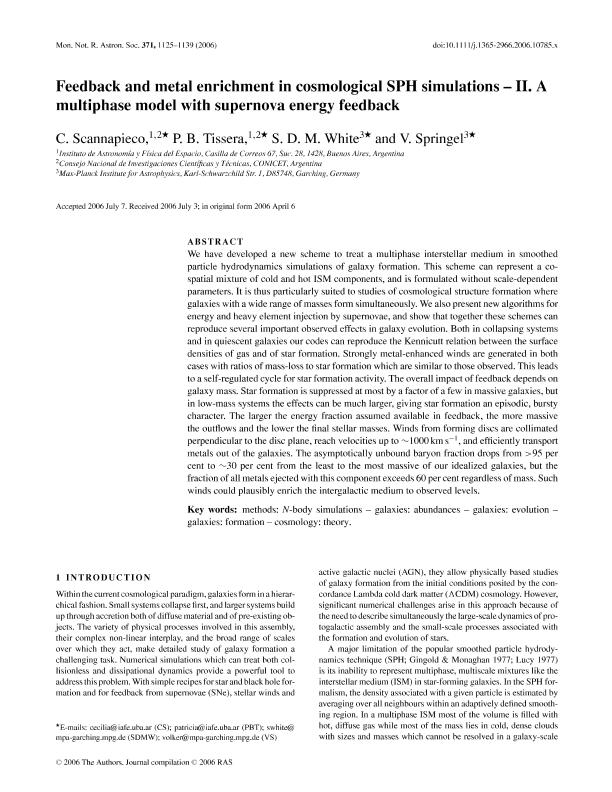Mostrar el registro sencillo del ítem
dc.contributor.author
Scannapieco, Cecilia

dc.contributor.author
Tissera, Patricia Beatriz

dc.contributor.author
White, Simon D. M.
dc.contributor.author
Springel, Volker
dc.date.available
2017-08-08T15:10:58Z
dc.date.issued
2006-09
dc.identifier.citation
Scannapieco, Cecilia; Tissera, Patricia Beatriz; White, Simon D. M.; Springel, Volker; Feedback and metal enrichment in cosmological SPH simulations - II. A multiphase model with supernova energy feedback; Oxford University Press; Monthly Notices of the Royal Astronomical Society; 371; 3; 9-2006; 1125-1139
dc.identifier.issn
0035-8711
dc.identifier.uri
http://hdl.handle.net/11336/22009
dc.description.abstract
We have developed a new scheme to treat a multiphase interstellar medium in smoothed particle hydrodynamics simulations of galaxy formation. This scheme can represent a cospatial mixture of cold and hot ISM components, and is formulated without scale-dependent parameters. It is thus particularly suited to studies of cosmological structure formation where galaxies with a wide range of masses form simultaneously. We also present new algorithms for energy and heavy element injection by supernovae, and show that together these schemes can reproduce several important observed effects in galaxy evolution. Both in collapsing systems
and in quiescent galaxies our codes can reproduce the Kennicutt relation between the surface densities of gas and of star formation. Strongly metal-enhanced winds are generated in both cases with ratios of mass-loss to star formation which are similar to those observed. This leads to a self-regulated cycle for star formation activity. The overall impact of feedback depends on galaxy mass. Star formation is suppressed at most by a factor of a few in massive galaxies, but in low-mass systems the effects can be much larger, giving star formation an episodic, bursty
character. The larger the energy fraction assumed available in feedback, the more massive the outflows and the lower the final stellar masses. Winds from forming discs are collimated perpendicular to the disc plane, reach velocities up to ∼1000 km s −1, and efficiently transport metals out of the galaxies. The asymptotically unbound baryon fraction drops from >95 per cent to ∼30 per cent from the least to the most massive of our idealized galaxies, but the fraction of all metals ejected with this component exceeds 60 per cent regardless of mass. Such winds could plausibly enrich the intergalactic medium to observed levels.
dc.format
application/pdf
dc.language.iso
eng
dc.publisher
Oxford University Press

dc.rights
info:eu-repo/semantics/openAccess
dc.rights.uri
https://creativecommons.org/licenses/by-nc-sa/2.5/ar/
dc.subject
Methods; N-Body Simulations
dc.subject
Galaxies: Abundances
dc.subject
Galaxies:Evolution
dc.subject
Galaxies:Formation
dc.subject
Cosmology:Theory
dc.subject.classification
Astronomía

dc.subject.classification
Ciencias Físicas

dc.subject.classification
CIENCIAS NATURALES Y EXACTAS

dc.title
Feedback and metal enrichment in cosmological SPH simulations - II. A multiphase model with supernova energy feedback
dc.type
info:eu-repo/semantics/article
dc.type
info:ar-repo/semantics/artículo
dc.type
info:eu-repo/semantics/publishedVersion
dc.date.updated
2017-08-07T19:06:35Z
dc.journal.volume
371
dc.journal.number
3
dc.journal.pagination
1125-1139
dc.journal.pais
Reino Unido

dc.journal.ciudad
Londres
dc.description.fil
Fil: Scannapieco, Cecilia. Consejo Nacional de Investigaciónes Científicas y Técnicas. Oficina de Coordinación Administrativa Ciudad Universitaria. Instituto de Astronomía y Física del Espacio. - Universidad de Buenos Aires. Facultad de Ciencias Exactas y Naturales. Instituto de Astronomía y Física del Espacio; Argentina
dc.description.fil
Fil: Tissera, Patricia Beatriz. Consejo Nacional de Investigaciónes Científicas y Técnicas. Oficina de Coordinación Administrativa Ciudad Universitaria. Instituto de Astronomía y Física del Espacio. - Universidad de Buenos Aires. Facultad de Ciencias Exactas y Naturales. Instituto de Astronomía y Física del Espacio; Argentina
dc.description.fil
Fil: White, Simon D. M.. Gobierno de la Republica Federal de Alemania. Max Planck Institut Fur Astrophysik; Alemania
dc.description.fil
Fil: Springel, Volker. Gobierno de la Republica Federal de Alemania. Max Planck Institut Fur Astrophysik; Alemania
dc.journal.title
Monthly Notices of the Royal Astronomical Society

dc.relation.alternativeid
info:eu-repo/semantics/altIdentifier/url/http://mnras.oxfordjournals.org/content/371/3/1125
dc.relation.alternativeid
info:eu-repo/semantics/altIdentifier/doi/http://dx.doi.org/10.1111/j.1365-2966.2006.10785.x
dc.relation.alternativeid
info:eu-repo/semantics/altIdentifier/url/https://arxiv.org/abs/astro-ph/0604524
Archivos asociados
